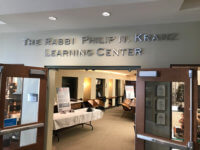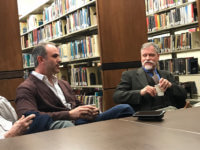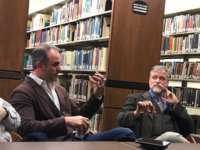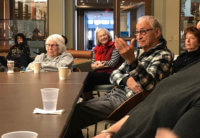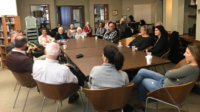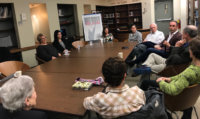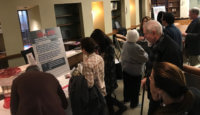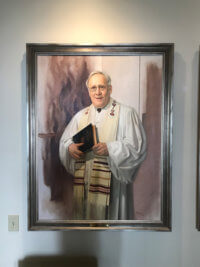I feel so lucky to have been invited to serve as the inaugural author at Temple Sinai’s Authors Series event. Temple Sinai holds a special place in my heart because of all of the wonderful memories I have there. Rabbi Philip Kranz, now the Rabbi Emeritas, previously oversaw my wedding and has been a lifelong friend.
It was a great honor to be able to speak to the many attendees that came to hear about Son of a Bitch in the learning center dedicated to him and his legacy. Although there is a beautiful oil painting hanging outside of the learning center of Rabbi Kranz, he is still very much alive and well ( I always thought you had to die before somebody painted a picture of you). His work in the community with children, adults, religious studies, and families continues to this day.
In addition to marrying my wife and me, Rabbi Kranz had another very important impact on my life at a time when I was struggling emotionally. I was 16 years old and just about to enter into my senior year in high school. I grew up in Marietta, Georgia, which was a bit of a roller coaster ride for me as a young Jewish kid. The high school I attended did not have many Jewish kids. If I remember correctly, I only knew of one other in my class of 400.
I was very insecure about my Jewish heritage. I was lucky to have found a core group of friends who were incredibly curious about and accepting about my Jewish background but I could not get away from the fact that I was different from them. Part of the problem was that Christianity was very much injected into our high school experience. The large Baptist Church down the road was very involved in our scholastic and extracurricular activities including sports. Christian prayer was a regular occurrence at PTA meetings and sporting events. When you are that age, you just want to fit in. In my mind, I didn’t.
In fact, it was a non-issue for most people, even those outside of my close circle of friends. But for a handful of kids and their families, my being Jewish was very concerning to them, including one of my closest friends. It wasn’t that my friend and his family thought I was a bad person. They liked me very much. Mostly, it was their sadness that despite me being a nice kid, I was unfortunately going to go to hell.
The summer before my senior year, I sat on my good friend’s front porch with his father. The man wanted to talk to me. He wanted let me know that he thought I was a great kid, a hard worker, and a good person, but he was very concerned about my soul and wanted to encourage me to accept Jesus Christ. He told me that there was still time. He felt that the world would be coming to an end soon and that when it did Jesus would appear and give people like me a second chance. He told me that I even had the type of character that could lead other people like myself and that we too could make it to heaven if we decided to accept Jesus. Needless to say, that was a very scary conversation for me. This was 1990.
Following that conversation, I had signed on to go to a football camp at Stetson University. Many of my football playing friends were going to attend. I was very excited about the idea of getting away from home and having some fun with my buddies and playing a lot of football. There was one caveat, though, in that each night the camp would hold a church service. Despite this fact, I was able to convince my parents to let me go as long as it would not be required that I attend church service. The coaches made arrangements for me to read or watch TV during the service.
The week at Stetson was a lot of fun and most people didn’t ask questions as to why I was missing the church service. If they did, I explained that I was Jewish and that it didn’t make sense for me to go. Their response to my answer, though, was different then the responses I had gotten in the past. In a way, because there was so much religion going on that week and so much conversation about Christ, they seemed to feel emboldened to ask me why I didn’t see the error in my thinking.
Many of these kids, who were not my close friends, addressed me as if I was their only concern in life. They put their hands on my shoulders, they walked slowly with me from practice field to practice field. They would talk to me at night, lying in the bunk beds of the dormitory. At times, I found them speaking together quietly and then approaching me in groups. The pressure was on. They wanted me to convert to save my soul.
On the last night of camp, the camp directors brought in a “fire and brimstone” preacher – a man who was going to lecture about sin and hell and being saved. On this night, my “friends” pressured me to go to the service. They told me it would not be a big deal. “Just come,” they said. They didn’t stop until I agreed.
The church was beautiful with high arching walls and a three story ceiling. It was lit beautifully by candles and yellow light and had vibrant colors of red and blue and green. The preacher stood on high with the Bible in his hand pounding a podium as he spoke in depth about the very nature of hell. The heat. The blackness. The fear. The melting flesh. The voices. All for those people who did not accept Jesus Christ as their Lord and Savior. As he spoke more fervently about his total and complete understanding of what it was like to be in hell, he began to ask for people to come and avoid such tortures by accepting Christ. I started to see my friends turn around toward me.
As the preacher called for more volunteers to be saved, several of the football players began to stand and move forward. Mind you, over the course of the week, we didn’t just sit around and talk about religion. We also acted like total idiots. As there were several high school teams attending the football camp, there were many kids attending that we played against. And as 15, 16, and 17-year-old boys do, we talked a lot of trash about each other. “I hate this kid” because he’s so cocky. “He thinks he’s all that. We should kick his ass the next time we see him on the field.” But in that church, they were all brothers.
People whom they had spoken about in negative ways, they were now hugging because of their decision to be saved. It felt very hypocritical. The more kids that stood up to be saved, the more the rest of the group would look at me. It was as if their eyes were grabbing me like a thousands hands and pulling me from my bench into the aisle and then shoving me at my back toward the fist pounding preacher who was ready to slap his hand on my forehead and remove my Jewish identity.
I felt so panicky that I began to tear up. I had a lump in my throat. The back of my neck flashed red hot. I didn’t know where to turn. I was supposedly surrounded by friends yet they wanted me to do something that I knew I couldn’t do.
I got up and I walked out of the church and found a quiet place to sit. I must’ve sat there alone for an hour in a rocking chair in the dark crying. I wanted to do what my friends want me to do yet I couldn’t bring myself to get out of the chair and go back into the church. I thought of my parents. I thought of my grandparents. I thought of all the Jews around the world and what they had gone through because they were Jewish. I thought of Israel. I thought of the Holocaust.
I wanted to do it but I was too scared.
It was then an African-American coach walked past me and saw that I was upset. He stopped and asked me if I was okay. I told him I wasn’t – that I was feeling a lot of pressure to convert to Christianity and that I was Jewish. Sensing the weight of the situation, he said that we should go down the street and get a hamburger at McDonald’s. I’d seen him on the field coaching other kids and I figured that I could trust him.
We walked down the street and sat in the McDonald’s. As we began to eat, he broke the silence and he told me it was going to be okay. He told me not to worry about it. He told me that the Jews were God’s chosen people. He smiled a lot and sipped a strawberry milk shake and ate his fries and burger. Sensing I was coming around, he suddenly put his hamburger down and leaned forward on his elbows. He had a serious look on his face. He looked left and then right to make sure we were alone.
“You know what I have a problem with?” he asked.
I looked at him not knowing where he was headed. “What?” I asked him.
He said, “All these white people talk about Jesus, always talking about his blonde hair, blue eyes, and pale white skin.” I nodded. “Jesus was in the desert – the Middle East. You know what I’m saying?”
No, I told him. “What are you saying?” I asked him.
He looked at me with as serious a face I had ever seen and put his pointer finger down on the table like a hammer. “You know Jesus was a black man!” he said. “Ain’t no way a white man pale skin and blue eyes, blonde hair going to grow up in the desert.”
I nearly fell out of my chair I started laughing so hard.
He took a big bite of his hamburger and started chuckling along with me. “You know I’m right,” he told me.
I told him I’d never thought about it before but what he was saying sure made a lot sense. We laughed ourselves silly the rest of the night.
When I got back to town, despite having the wonderful conversation that I did with the African-American coach (who, by the way, I never saw again and do not know his name), I was still very conflicted. The thought of my friends constricted around me even more than before. My close friends were not football players and so they were not in the know and I did not share with them what I had been through. I tried to face this down alone, not sharing anything with my parents either. The truth was that I was still considering converting to Christianity.
Not wanting to make the decision alone, in fact not wanting to make the decision at all, I decided to turn to the one person who I thought could give me the best advice: Rabbi Krantz. I picked up the phone and scheduled an appointment with him and several days later drove to his office.
I told Rabbi Kranz the story and told him that because of everything that happened to me and because of all the new information that I had about Christianity and hell and heaven, I had decided “I think I want to convert to Christianity.” It was very hard for me to say those words out loud, especially to my rabbi. In a way, I think I wanted Rabbi Krantz to reassure me that it was the most ridiculous idea on the planet. I just needed to hear him say it. I needed to feel his superior intelligence on the matter. I needed to feel his confidence so that I could reassert my own.
Following my declaration to Rabbi Kranz, I sat back in my chair and waited for his response. I’ll never forget the time he took before speaking. He leaned back in his chair and laced his fingers together and rest them on his tummy. After a minute of thinking, he sat forward and spread his arms open wide in a very welcoming way. “Look,” he said. “I think it’s a great idea.”
My face nearly fell off. “What?!” I asked.
He suddenly got a thinking grin on his face. ” Yeah,” he sighed. “Christianity is a beautiful religion. Jesus was an incredible man. He did a lot of amazing things for people. If you really feel connected to this idea, I think you should go for it.”
I think my next words were something like “what in the hell are you talking about?”
“What do you mean?” He asked surprised. “I’m just listening to what you’ve shared with me.”
“I came here so you could talk me out of it,” I said. I couldn’t believe what I was hearing. I suddenly wanted to vomit.
It was then that Rabbi Kranz began to share with me that it was perfectly natural for me to question my religion and my beliefs in God. It was perfectly natural for me to feel affiliation with my friends and even other religions. He began to share with me that the word Israel means to question God. Suddenly, everything I had been through was in perfect harmony with what it meant to be a Jew.
Rabbi Krenz and I talked for several hours. I was able to release much of my anxiety, my fear, my sadness over being different. At time when I thought being a man was being strong and not showing emotion, Rabbi Kranz in all his strength and wisdom let me know that it was okay to cry – that crying was as important as joy and laughter. And that if I ever wanted to cry, all I had to do was come and see him and that we could cry together.
I cannot think of a better person to name a place of learning after then Rabbi Kranz. And I cannot think of a better place to host my novel than the Philip Kranz Learning Center at Temple Sinai.
Thank you Rabbi Kranz for all you have done for me and my family. Thank you Rabbi Brad Levanberg for inviting me to speak. And thank you to the Temple Sinai family!

